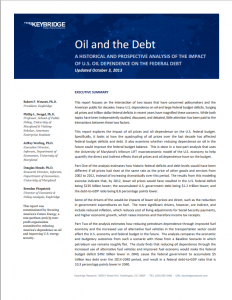Full Title: Oil and the Debt: A Historical and Prospective Analysis of the Impact of U.S. Oil Dependence on the Federal Debt
Author(s): Robert F. Wescott, Ph.D, Phillip L. Swagel, Ph.D., Jeffrey Werling, Ph.D, Douglas Meade, Ph.D., and Brendan Fitzpatrick
Publisher(s): Securing America's Future Energy (SAFE)
Publication Date: October 1, 2013
Full Text: Download Resource
Description (excerpt):
Commissioned by Securing America’s Future Energy, Oil and the Debt focuses on how the quadrupling of oil prices over the last decade has affected federal budget deficits and debt. It also examines whether significant reductions in oil dependence could improve the federal budget outlook going forward.
The paper is broken into two main sections, each of which addresses a different issue:
The Part One analysis estimates how historic federal deficits and debt levels would have been different if oil prices had risen at the same rate as the price of other goods and services from 2002 to 2012, instead of increasing dramatically over this period. The results from this modeling exercise indicate that, by 2012, lower oil prices would have resulted in the U.S. federal deficit being $235 billion lower; the accumulated U.S. government debt being $1.2 trillion lower; and the debt-to-GDP ratio being 6.6 percentage points lower.
The Part Two analysis estimates how reducing petroleum dependence through improved fuel economy and the increased use of alternative-fuel vehicles in the transportation sector could affect the U.S. economy and federal budget in the future. The study finds that cutting oil consumption in the transportation sector in half over the next three decades would make the federal budget deficit $492 billion lower in 2040, cause the federal government to accumulate $5 trillion less debt over the 2014-2040 period, and result in a federal debt-to-GDP ratio that is 10.3 percentage points lower in 2040.
Oil and the Debt makes a powerful argument that policymakers should consider the potential short-and long-term fiscal benefits of reducing American oil dependence.
